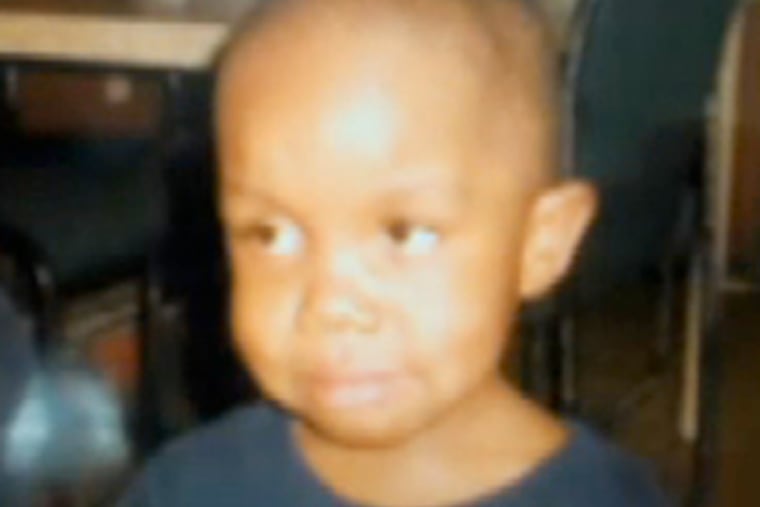Guilty verdict in torture death of boy, 3
Nadera Batson did not shed any tears last week during her trial in the beating death of her godson, 3-year-old Jaquinn Brewton, even when prosecutors showed photos of the child's battered and burned body.

Nadera Batson did not shed any tears last week during her trial in the beating death of her godson, 3-year-old Jaquinn Brewton, even when prosecutors showed photos of the child's battered and burned body.
And she showed little emotion when a neighbor from the West Philadelphia boardinghouse where she had lived with the child testified about the constant whipping sounds and child's screams coming from Batson's room.
But Batson, 25, burst into tears Monday, sobbing and heaving, as a jury foreman declared her guilty of third-degree murder in Jaquinn's 2011 death.
"The only person she ever cried for was herself," said Assistant District Attorney Bridget Kirn, who had described to jurors the "systematic and unimaginable" suffering Jaquinn endured during the three months he lived with Batson and her boyfriend, Marcus King.
Jaquinn's death stood out as one of the most horrific child-abuse cases the city has seen in recent memory, Kirn said before trial.
According to testimony, Batson beat Jaquinn daily with her hands, shoes, belts, and a metal hair pick that she dragged across his skin. She poured boiling liquid on his feet, causing second-degree burns and so much swelling that he could not walk or wear shoes.
And she burned the child's bottom with a cooking blowtorch as punishment for potty training.
Autopsy photos showed a sea of scars, burns, and bruises across the child's 32-pound body.
The couple never sought medical attention for the gravely injured child - a doctor testified that Jaquinn would have been treated with morphine for his burns - because they were afraid they would get in trouble, according to King.
On the morning of June 29, 2011, Batson finally called paramedics, who found Jaquinn lying lifeless on a trash-strewn floor clad in only a diaper. She told police he had fallen down steps, an explanation medical experts rejected.
Before trial, Batson rejected a plea deal that included a prison sentence of 30 to 60 years. Kirn said she would now ask Common Pleas Court Judge Barbara A. McDermott to impose a sentence that would keep Batson behind bars for life.
King pleaded guilty to third-degree murder but has yet to be sentenced.
On Monday, the jury also found Batson guilty of conspiracy, possession of an instrument of crime - the blowtorch - and endangering the welfare of a child.
Court officers crowded the courtroom as the verdict was read because relatives of Jaquinn and Batson nearly came to blows in the hallway outside the courtroom Friday.
Jaquinn's mother, Ashley Brewton, testified that Batson, her friend of seven years, had offered to take in Jaquinn when Brewton moved into a homeless shelter with three of her other children.
After the verdict, she said felt relieved at the justice it offered.
Kirn had argued that the unending abuse called for a first-degree murder conviction, which carries life without parole.
But Batson's lawyer, Lee Mandell, argued that while Batson did "some terrible things," prosecutors did not prove she "specifically intended to kill" Jaquinn - a requirement of first-degree murder.
Still, Kirn said: "This verdict recognized that what she did was cruel and lacked any human capacity."
Compounding the tragedy was that Jaquinn had been on the radar of the city's child welfare agency when his abuse began, according to city and state reviews of the circumstances of his death obtained by The Inquirer.
Jaquinn's mother told a social worker from the Department of Human Services in March 2011 that she had lost track of the boy after he went to live with Batson. She knew the block where Batson lived but not a specific address.
The agency failed to take any steps to find the child and neglected to file a missing-person report, according to the city review.
The review criticized DHS for not consulting with its law department to take possible court action to find Jaquinn. It also said the agency violated policy by missing several monthly visits with Jaquinn, and faulted DHS for failing to complete two previous abuse investigations involving his family within the required 60-day time frame.
The agency's failure to file a missing-person report proved critical after a West Philadelphia police officer questioned Batson on the street about Jaquinn's appearance just three days before his death.
Alicia Taylor, a DHS spokeswoman, said Thursday that the agency had taken steps to reinforce its policies on locating missing children.